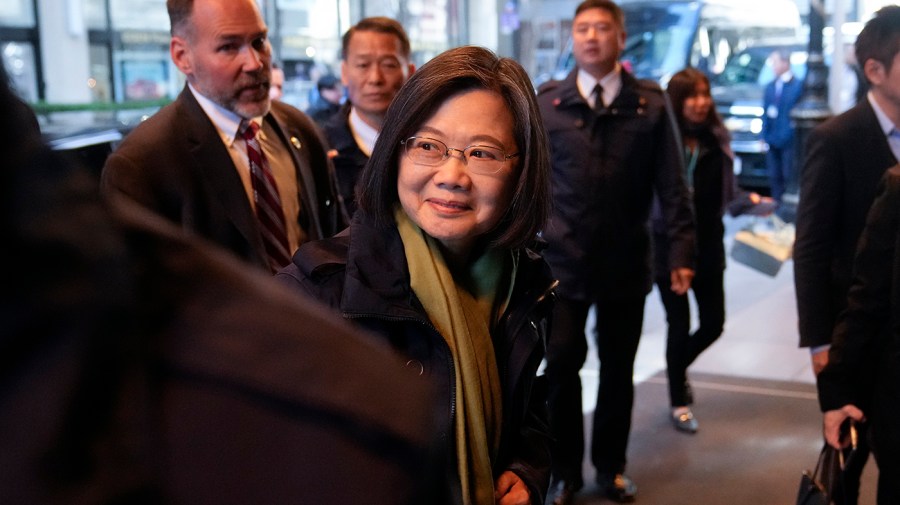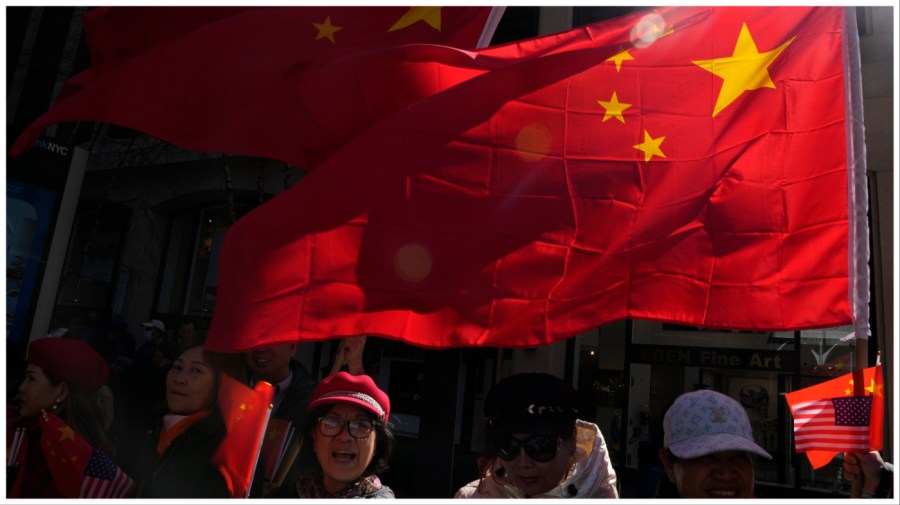McCarthy set to make mark on foreign policy with high-profile Taiwan meeting
An expected meeting between Republican House Speaker Kevin McCarthy and Taiwanese President Tsai Ing-wen this week in California is a careful exercise in standing up to Beijing’s threats while holding back from triggering a war in the Pacific.
For Tsai, a Los Angeles run-in with Washington’s most powerful California representative, is a convenient and strategic cover story to defend against provoking a particularly dangerous military response from China.
Still, McCarthy is unlikely to use a California meeting in place of traveling to Taiwan personally.
Earlier this month, the Speaker told reporters that meeting the Taiwanese president in America “has nothing to do with my travel, if I would go to Taiwan or not.”
“China can’t tell me where or when to go, and none of that discussion ever happened. If the president happens to be in America, then I’m going to meet with her,” he said.
McCarthy has entered the Speakership having established a reputation as a savvy electoral strategist; now he is moving to make his mark on foreign policy, with an eye on China.
One of his first moves as Speaker was creating a House select committee on China, a panel that he said he tried to create with former House Speaker Nancy Pelosi (D-Calif.) in 2020 before Democrats backed out.
It is viewed as one of Congress’s best opportunities to find bipartisan agreement, with Taiwan being a major focus.
McCarthy said at the House GOP’s annual issues retreat earlier this month that it is of the upmost importance “that China does not think to go capture Taiwan,” and expressed concern about Chinese President Xi’s recent meeting with Russian President Vladimir Putin.

‘Transiting’ through the US
The Speaker is expected to welcome Tsai this week in Los Angeles, in cautiously orchestrated travel where the Taiwanese president is “transiting” through the U.S. to Taiwan on the way back from official engagements in Central America.
Tsai reportedly met with the Democratic House Minority Leader, Rep. Hakeem Jeffries (N.Y.), while she was “transiting” through New York.
“We know it’s a ruse, but it’s enough of a face saver for the Chinese to say, ‘yeah, we’re gonna rattle the sabers, but it’s not a red line for us,’” Patrick Cronin, Asia-Pacific security chair at Hudson Institute, said about the meetings between Tsai and lawmakers.
Beijing has warned of “counter measures” and “consequences” if Tsai meets with U.S. officials, in particular McCarthy, and could carry out military maneuvers around the island to intimidate and scare the people of Taiwan – moves that experts view as somewhat restrained provocations.
“Beijing has said it will respond in some fashion, but it remains to be seen how extreme its reaction will be,” said Patricia Kim, fellow at the Brookings Institution’s Foreign Policy Center for East Asia Policy Studies.
She added that China has tied its own hands in lashing out at Taiwan, given that President Xi Jinping is trying to portray himself as a global peacemaker – offering to mediate between Russia and Ukraine and recently breaking through tensions between Iran and Saudi Arabia.
“A harsh military reaction to President Tsai’s visit to the United States would essentially undermine Beijing’s efforts to paint itself as a peace advocate and the United States as the instigator of trouble,” she said.
How would China react to McCarthy in Taiwan?
China’s reaction to Pelosi’s visit to Taiwan in August 2022 established, in a sense, one standard for how Beijing reacts to what it views as unacceptable interference by Washington in its affairs.
This included cutting off specific diplomatic cooperations with the U.S. and carrying out large-scale military exercises in six locations off Taiwan’s coast, complete with missile test launches over the island. And these types of military provocations from China’s People’s Liberation Army (PLA) have only increased in frequency since Pelosi’s visit.
A visit by McCarthy to the island would likely trigger a similar, if not more intense response from the PLA, but the benefits – for both the U.S. and Taiwan – likely outweigh the risks.
“Taiwan is a resilient society that believes in the power of democracy, but we cannot solve 21st century challenges or push back against authoritarianism alone,” Tsai said as part of remarks Thursday to the Hudson Institute in New York, where she was honored with a ‘Global Leadership Award’.
“We will continue to work with the United States and other like-minded democracies to demonstrate that democracy can deliver and that Taiwan is committed to safeguarding our way of life.”

A Taiwan trip for McCarthy, something he last year expressed interest in doing as Speaker, is also viewed as an important responsibility, given he is beginning his term as opposed to Pelosi closing out her tenure. Traveling to the island can be a significant signal of bipartisan solidarity while also allowing the Republican leader to gain insight into Taiwan’s political future as it heads to elections in January, Cronin said.
“My recommendation to the Speaker would be to try to get in before the election season is really serious in September,” he said, adding that McCarthy would get a chance to meet with potential presidential candidates and assess their views on Taiwan’s foreign policy, its relations with the U.S. and how it sees the future of relations with China.
Taiwan approaches an election
There are debates in Taiwan about the way forward in how Taipei interacts with Beijing.
While a key pillar of China’s ambitions is overtaking Taiwan, Beijing balances subsuming the island with economic, diplomatic and political coercion even as it builds up and prepares its military for a takeover.
While Tsai is at the end of her second, four-year term as president, her party, the DPP, is likely to put forth a candidate that shares her view of Taiwan operating on the global stage from a position of strength.
“The [People’s Republic of China’s] escalation of tension is evident, but Taiwan’s response has been measured and composed, demonstrating to the world that we are the responsible cross-strait stakeholder,” she said Thursday. “The Taiwanese people want peace, not conflict, and history tells us that the best way to avoid war is through building strength.”
But the opposition Kuomintang (KMT) party, is signaling closer ties with Beijing.
Taiwan’s former president and KMT party member, Ma Ying-jeou, traveled to Shanghai ahead of Tsai’s departure for the U.S.
Ma’s nearly two-week trip through China is being described as private travel for the former politician but is loaded with political significance.
Cronin said that Tsai, in remarks in New York, said, “China wants victory without a fight.”
“They just want to intimidate and coerce or in this case, try to persuade and seduce, probably the KMT more than the DPP,” he said.
Emily Brooks contributed to this report.
Copyright 2023 Nexstar Media Inc. All rights reserved. This material may not be published, broadcast, rewritten, or redistributed. Regular the hill posts







